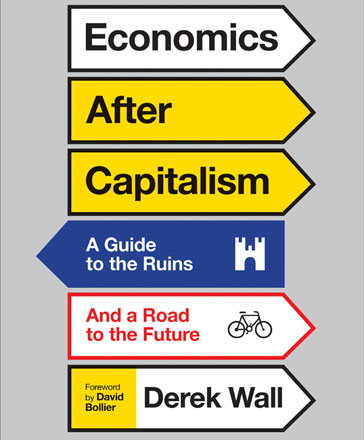Economics After Capitalism: A Guide to the Ruins and a Road to the Future
Derek Wall
London: Pluto Books, 2015
Pp. 174
It is a basic premise of this book that capitalism doesn’t work, as dramatically illustrated by the 2008 financial crisis caused by neo-liberal policies that deregulated banking. Other persistent signs of malfunction include growing income inequality, rising poverty and mounting environmental degradation. Yet, in many quarters, it is still business as usual, enforcing the “Washington Consensus” of deregulation, privatisation, tax cuts for corporations, and reduced welfare and trade union rights.
But what is the alternative? This is the question addressed by Derek Wall who teaches political economy at Goldsmiths, University of London and is international coordinator of the Green Party of England and Wales. “Providing an alternative based on the common good, rather than the needs of the 1 per cent, is challenging. However, anti-capitalism has deep roots, has never been removed and has the potential to flower.” (p. 5)
To prove his point, Wall reviews the whole range of anti-capitalist critique. At one end of the spectrum are reformers like Joseph Stiglitz and George Soros who think the system can be fixed by replacing the “Washington Consensus” package with updated Keynesian policies. Others disagree, calling for a total overhaul. Naomi Klein is perhaps the best known among those who target the monopoly practices, exploitation, crimes and overblown political clout of multinational corporations that continue the legacy of colonial conquest in their search for markets, raw materials and cheap labour. Among this group, some advocate “popular action to localise production” whereby “the free market can be restored and mighty corporations made low”. (p. 48)
The “small is beautiful” contingent of green economists are almost alone in categorically opposing growth and globalisation which wreck the environment, waste resources and force workers to work more for less. According to them, “All needs in a capitalist society are transformed into the need for commodities… Economic growth does not even remove poverty: the richest generally see the greatest gains, and the poorest are usually separated from resources…” (p. 54)
Others fault the finance industry and monetary policy.
Very interesting chapters cover Marxist, autonomist and anarchist critiques, showing more overlap among them than one might expect, and providing fascinating insights into the ideas, actions and persons who motivate these movements. Walls examines crucial questions such as whether Marx had environmental concerns and the validity of his argument that capitalism’s development tends to create communism.
He also covers different views on imperialism and globalisation, and how Third World leaders, such as Castro, built on Marx, but added their own insights. In addition to countries that have opted for socialism, like Cuba and Venezuela, the most practical approach comes from this camp, where autonomous or anarchist groups carve out free zones through direct action, not waiting for guidance from political parties or states.
Wall cites examples from this area, naming the Arab Spring among signs of discontent with the existing order, and describing the work of the YPC (Community Defence Force) in the Kurdish zone Rojava in Syria, as “a practical example of anti-capitalist, ecological and feminist alternatives.” (p. 103)
For the more radical thinkers, a key concept is “the commons”, communal land or resources, which have been enclosed as private property under capitalism. (Some current land disputes in Jordan echo this conflict.) “Throughout history, the commons has been the dominant form of regulation, providing an alternative almost universally ignored by economists, who are reluctant to admit that substitutes to the market and the state even exist. Within the commons, scarcity, if it exists, is usually managed and resources conserved through allocation systems arranged by users.” (p. 145)
Today, many anti-capitalists advocate a return to the commons in the form of collective action projects. Examples range from community-owned football teams and collective three-dimensional printing labs to communally regulated forests in Finland, grassroots movements in South America and South Africa resisting the privatisation of water, open source designers seeking to maintain free access in cyberspace, and greens and ecofeminists preserving communal land from private corporations. Walls suggest that the commons could be extended to the right of workers to buy up the firms they work for.
“Economics After Capitalism” is like a crash course in critical economy. It disproves the notion that economics is boring or dense, partly because it approaches the subject in terms of human needs instead of dry statistics, and partly because of Wall’s accessible writing style. Without over-simplification of ideas, he writes in a manner that laypersons can understand, throwing in a lot of examples from the real world and even touches of humour, to give hope that humans could organise their common life differently and better.
“Economics After Capitalism” is available at the University Bookshop.
